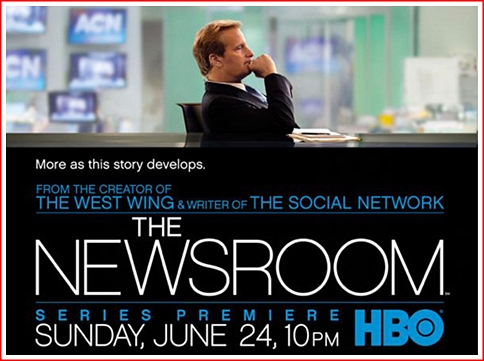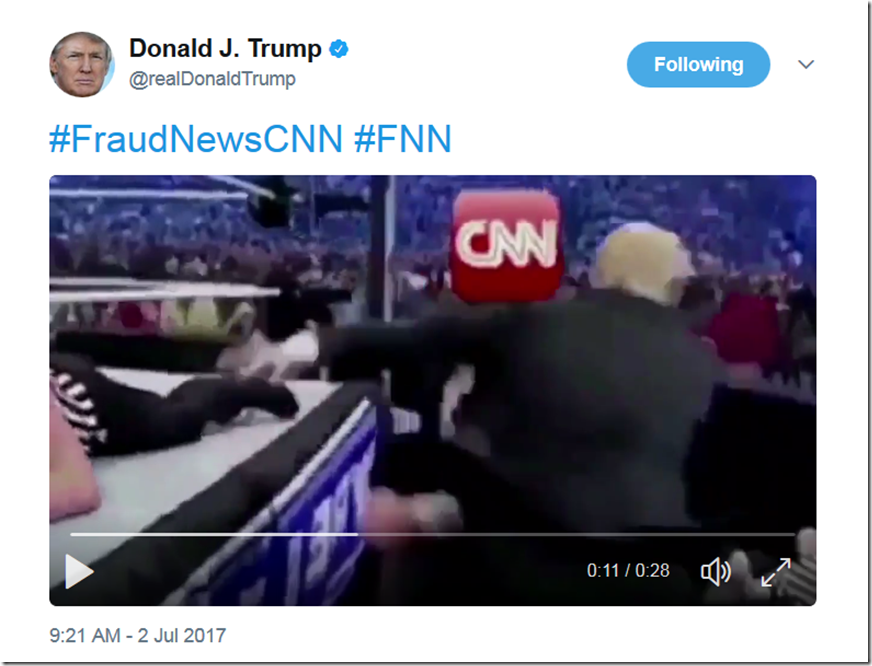HBO’s The Newsroom: A Cable Newser’s Take
I suppose it isn’t fair to criticize Aaron Sorkin’s new HBO program, “The Newsroom,” for being unrealistic. After all, we don’t expect “Law and Order” to be a perfect reflection of American jurisprudence, or “NCIS” to capture the nuances of military investigations, or “Mad Men” to nail 1960s advertising culture with precision.
But I’m having a difficult time suspending my disbelief when it comes to “The Newsroom.” The show’s central assertion rings false, the premise seems contradictory, and the program removes the true drama that often occurs in a newsroom.
If you haven’t seen it, “The Newroom” centers around a cable news program called News Night and its anchor, Will McAvoy (Jeff Daniels). The series begins when Mr. McAvoy, a well-regarded objective journalist, explodes during a public event by blasting a questioner’s assertion that America is the greatest country on the planet. His rare lapse into “opinion journalism” ultimately convinces McAvoy that he should abandon his objectivity to tell “the truth” every night instead.
Here are three reasons “The Newsroom” is off:
1. The Concept Isn’t Even Remotely Shocking: The show’s creators seem to believe that it would be “shocking” for a formerly objective anchor to suddenly abandon his neutrality and deliver a personal viewpoint. But that story dates back almost to the beginning of television news, when broadcasting legends Edward R. Murrow and Walter Cronkite, among many others, delivered strong personal views.
McAvoy protests the ideological nature of his cable competitors, but he’s actually not that much different. Bill O’Reilly, Rachel Maddow, Sean Hannity and Chris Matthews all deliver strong personal views every weeknight. They, like the fictional McAvoy, believe that their interpretation of the facts is right. It’s not exactly a novel concept.
2. The “Center” Isn’t The Center: In one of the show’s better moments, ACN’s news division president Charlie Skinner (Sam Waterston) insists that “facts are the center.” I agree. So why, in an episode about the rise of the Tea Party, did the show present two sides: the heroic people who opposed the Tea Party, and the buffoonish and ignorant characters who were part of it?
Here’s an alternative view of the center: Most Americans want our nation’s most vulnerable citizens—the impoverished, the sick, the elderly—to benefit from a safety net that allows them access to basic health care, safe housing, and nutritious food. Most of us want basic regulations that prevent businesses from abusing the law and endangering public safety, but don’t want those regulations to squelch innovation and unnecessarily cost jobs. But most people also recognize that The United States is almost $16 trillion in debt, meaning we’re going to have to make tough choices. That is the struggle that defines our times.
But you won’t find that fundamental question about “the center” anywhere on the show. Why present a truly challenging intellectual argument when you can show old video of failed Nevada Senate candidate Sharron Angle saying something stupid instead?

3. The Show Removes The Real Drama of a Newsroom: The show’s premiere episode is set on the first day of the 2010 British Petroleum oil spill. Within minutes—yes, minutes—the program’s staff already knows the cause, the amount of oil that’s gushing from the seafloor, and how long it could last.
The show’s most knowledgeable staffer on spill-related matters? Yup, it’s the program’s blogger, Neal Sampat (Dev Patel), who implausibly says he learned everything he needed to about deep water geology from a grade school assignment.
Drama in a newsroom rarely comes in the form of all-knowing characters who almost instantaneously have all of the answers. It comes in the form of teams of smart people working together—through a combination of contacting the right sources, doing the right research, and asking the right questions—to nail a story. When that unfolds before your eyes, it’s a whole lot more dramatic than watching people who seem to magically have all of the answers. (The show improved on that score in its fourth episode regarding the Gabrielle Giffords story; hopefully, more of the same will follow.)
What do you think of “The Newsroom?” Do you find my review unnecessarily harsh? Please leave your thoughts in the comments section below.


Totally agree on all points.
The show screams “liberal” – balance certainly not there.
Also, having worked in TV news, you are spot on about the unreality of the news room enviroment.
The show screams good writing, which you don’t see anymore on TV. Of course it is hyped drama. It is supposed to be entertainment, and of course they know the oil spill details in 10 mintues. It can’t very well unfold in real time. Sorkin is the best writer out there and brings a sense of the eithical crisis in reporting vs. profit margin to the viewer. Shut up with the liberal and conservative, quit keeping score and counting your own sides insults and watch some fantastic TV that packs intelligence and layers of texture instead of idiocy like Two Broke Girls or hate and spite like Jersey Housewives.
Sheila,
I suppose I should have mentioned in my post that I generally love whatever Aaron Sorkin writes. I agree with you that he’s an incredibly talented writer, and there have been some terrific scenes in The Newsroom so far (e.g. Will McAvoy’s opening monologue and Jane Fonda’s scene-stealing “Moses and Jesus” story).
As for “shut up with the liberal and conservative,” my criticism isn’t ideological. My criticism is that the show undercuts its premise of “telling the truth, wherever it lays” by being ideological. “Truth” doesn’t only come from one side – but it does on The Newsroom.
Thanks for commenting, and enjoy the show,
Brad
I’ve never worked in TV news, but I’ve worked in a print newsroom and the show strikes me as completely unrealistic — as a poor match for journalists as Grey’s Anatomy is a poor match for doctors. (Although it does have less sex!)
I love Aaron Sorkin’s writing but I think you hit the nail on the head when you say that truth doesn’t come only from one side. (Yet I’ve also worked for editors who believed that it does!)
“So why, in an episode about the rise of the Tea Party, did the show present two sides: the heroic people who opposed the Tea Party, and the buffoonish and ignorant characters who were part of it?”
Reminds me of a great Robert Benchley quote: “There are two types of people in this world: those who believe there are two types of people in this world and those who don’t.” Or Hawkeye Pierce (channeling Groucho) saying, “but enough about me – let’s talk about you: what do you think of me so far?”
I would have been far more interested in this show if I hadn’t read in reviews that it takes place in the recent past with actual news stories. One of the clever things about “Law & Order” was its way of fictionalizing actual cases so that you could see the parallels to real events but not be distracted by them. Sorkin in a sense takes the easy way out by creating responses and reactions in a fictional setting to stories that have already been hyperanalyzed and vetted, mostly with the intent of putting his particular spin on them. The post-9/11 episode of “The West Wing” that was specially scripted and shot (and inserted into an otherwise continuing story arc) so Sorkin could depict his fictional president lecturing visiting school kids about why the real event happened was probably a precursor to the method he’s employing on this show. As you wrote above, Brad, that undercuts his premise for the show.
James,
You make a terrific point about the “real events” element to “The Newsroom.” Sorkin’s technique of using actual events from two years ago seems to be a bad choice. As a news junkie, most of these topics seem like warmed-over rehash. I’ve seen Olbermann’s slamming of the Tea Party. And Maddow’s interview with a Koch brother. And Anderson Cooper’s outrage over the BP spill. This is, quite literally, old news.
It’s a shame, because “The West Wing” was one of my favorite shows. And that post-9/11 episode you mentioned was a masterpiece.
Thanks for commenting,
Brad
I think you raise some valid points. And I think Sorkin is guilty of proselytizing for the left more often than not. However, I enjoy smart writing. And Sorkin is a smart writer.
I enjoy the philosophical debate, and I look forward to the show giving a bit more play to the conservatives to balance out the storytelling. It would be interesting to see an episode where Will is called out to appear on Hannity’s show or O’reilly’s, kind of like the way Jon Stewart went on Fox to talk TV.
I agree with you on most of your points about the way the show portrays a newsroom. But my background from actually working In newsroom at the local level, I can’t help but agree with Belief of the telling the actually news story using facts and not fabricating the story by what we think the viewers want to see. I enjoy the show and at times am inspired by the message of communicating a detailed news story using truths and facts and not fabricating them to appeal to a certain demographic . This in turns dictate who buys air time and that news stories no matter who is affected the truth will come out and a le news story will be aired and people associated with it will be proud of the product on air..granted there is a lot of fiction with the show and how each story is tied together the outcome is the same. If only more anchors took a page out of Will McAvoy truths the news would be better off.
Leets start reporting the news and informing the public a
Than blasting them with celebrity splits , marriages and non sense and get back to NEWS.
I apologize for my rant…….
I think Ep 4 Gun Control, is a lot like your observation on the Ep. 3 Tea Party. Two sides presented, heroics vs. buffoons. Why would you see a departure from the essence here, on gun control? Maybe you should deepen your ken on the what the buffoons know.
They covered the Tea Party. How would they cover Occupy?
I did like your take on the show.
It’s social commentary. I’m not sure what’s so hard to understand about that. Is it liberal? Sure. Is it realistic? I have no doubts it is not. What is attempting to do is bring out really salient points about the way the media covers things by using the recent past and what appear to be the underlying facts and context that are missing from our 24 hour news cycle and blathering talking heads. There are few if any lines drawn connecting money to power, money to news and these are important things to discuss, and they are brought out in a very interesting way in this show.
This is important now more than ever as we debate whether or not to vote a member of the power elite into the oval office. (For the record, I’m part of the 1% and would probably benefit financially if Mitt was elected)
What’s important about this show, and the Daily Show and Colbert in particular is it helps you develop a media immune system by taking a step back and showing what’s going on and putting it into a larger context.
Why do you think conservative talking heads use their programs to tell you that other programs are trying to poison your mind, instead of using facts and a larger context to make their case? Why do the very religious home school their kids? To prevent them from seeing a bigger picture.
Without the mass media there would be no chance of the Republican party, in its current extreme form, of ever getting into power. The base – folks who regularly vote against their own self interest – would have no one controlling their minds and making them freak out about issues the rest of society (especially in the rest of the civilized world) has moved past – abortion, homosexuality, universal healthcare, equal pay, gun control, etc.
What I love about today’s conservatives is that, to them, the center is the left. What McAvoy says in the opening scene is true, yet it’s called liberalism because it’s not flag waving, exceptionalist BS — although he does call liberals “losers” during his screed, which many honest liberals would agree with.
The character criticizes — rather than patronizes — and points out that the country has many, many struggles before it today, chief among them is an unwillingness to discuss its problems without demonization of the others’ point of view because that’s what appeals to an increasingly unintelligent electorate.
The show is being labeled liberal because it criticizes the prevailing turn toward extreme conservatism. McAvoy portrays a traditional Republican who believes his party has been co-opted by the radical right….and guess what? He’s correct. If people can’t see that, they’re in denial.
Your points on “Why its off” are off.
And why the show is, for lack of a better antonym off of, on.
1. Why do you assume that the writers are trying to “shock” the viewer? I think they are well aware, even more so than you and I (with all the research that goes into putting a show like this together,) that they are many anchors or “talent” who’s shows are fueled by personal opinion.
1. Why its on- the media outlets, some for which I have worked for, tend to live a lie. One source says 2+3=7 and the other says 2+3=49, duh. Viewers are fatigued by the mal-nourishment we are fed by our “news” sources and are ready for the lies to be called out. (In other words, its relatable.) Whether youre on the left, right, middle, top or bottom, finding out the other guy lying is something most anxiously cross their fingers for.
2. Maybe you’re being modest with your coherency? What does that description of that particular episode have to do with the center being the truth.
2. Why its on- The foundation of the show is based on the fact that this journalist understands that America is not the greatest country in the world anymore, not because other countries did something to us, but due to what we’ve done to ourselves. He understands and realizes that the media should speak truths to logic; not bias, greed, or pride. (Some would argue that logic varies from person to person. I told that to my logics professor years ago and he nearly lost it. )
3. You do understand that each episode runs from 57-61 mins?? Part of my career was in radio. Did you ever watch “Frasier?” Great show. Not even close to an actual day in the studio, however. I’m pretty certain that It’s critics cared more about the content rather than the box it came in.
3. Why its on- video/audio editing, graphic design, wardrobe/make up, people calling in sick, loud obnoxious new hires, and too many egos to fit in one room. Yeah, I’m pretty glad the didnt do all that.
I wish it weren’t so, but I agree with your review on The Newsroom. I was pushing for it, since it is one of the few shows on TV that actually invites the audience to think. Most shows are there for people to mindlessly daze out to, but The Newsroom got brains moving and mouths talking! It was fun to hear the stir of debates that it ignited! From respectable news sources, like NPR and The New York Times, to just a few Dish coworkers gabbing around the lunch table, everyone had some input on the societal commentary featured in the episodes. Alas, the novelty has worn off the show, and now we are just left with boring office romances and squabbles with paparazzi. I’m not quite ready to abandon the show yet, especially since it has been renewed for a second season, but I think I’ll just end up recording it on my DVR rather than anticipating it each Sunday. Luckily, I have the Hopper DVR that has loads of recording space so, if the series does continue to let me down, at least I didn’t waste any significant memory on it. Let’s just keep our fingers crossed that Sorkin has some more tricks up his sleeve!
jeeze people. it is a well scripted, well acted tv show. have you ever read a book of fiction? open your minds just a wee bit. or would you prefer to watch a show about what really goes on in a tv news station. (yawn). and if you don’t like the political inferences, turn on fox.
I’m sorry, but I think you don’t understand the show’s concept. The show’s concept is not “that it would be “shocking” for a formerly objective anchor to suddenly abandon his neutrality and deliver a personal viewpoint”. The show’s concept is exactly the opposite: they ban all personal viewpoints from the news, and deliver the facts. I cannot
“Bill O’Reilly, Rachel Maddow, Sean Hannity and Chris Matthews all deliver strong personal views every weeknight”. Yes, they do. They also aren’t very good at telling cold hard facts to their viewers.
In a world where the news is mostly a collection of pundits (either liberal or conservative) stating their opinion, an actual show which delivers only the facts, is in fact “shocking”. In my opinion, it should be the other way around.